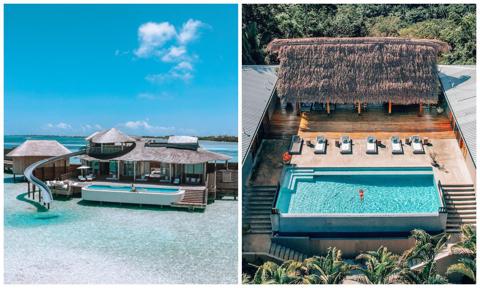
HELLO! shows you where to have eco-conscious yet wildly luxurious vacations at some of the globe’s chicest hotels..
Whoever said luxury and environmentally-friendly are mutually exclusive didn’t stay at any of these hotels, which have made fantastic strides in offering the very best of both. As climate change and environmental degradation have become more urgent in recent years, an onus falls on each of us to do our bit. On this front, many hotels across the world have endeavoured to make a change, thus engendering the rise and rise of luxury eco-resorts.
These outstanding locations provide the ideal fusion of comfort and sustainability, enabling you to indulge without the guilt of environmental harm. They are the pinnacle of eco-luxury, so consider putting your feet up at one of these places the next time you’re planning to go wheels up!
Sumberkima Hill, Bali
Hidden in the hills of northwestern Bali in Indonesia, Sumberkima Hill is its own little community of private residences scattered on either side of a mount with fantastic views. All villas are private, but the area coexists with villages, local residents, schools, and restaurants. But beyond the fabulous villa experience, the property devotes itself to respecting and regenerating the surrounding environment. From reforestation in the mountains to setting up a reef restoration project in the bay, Sumberkima Hill’s ecological impact extends far beyond the villa walls and keeps the surroundings thriving all year round.
HELLO! loves: The villas are divided into sections depending on views. So you get front-row seat options to sunrises, sunsets, sea views or volcano views.
Raffles Udaipur, India
Standing majestically on a private island on the Udai Sagar Lake, this luxury haven boasts an extraordinary eco-conscious stay that begins with emission-free, battery-operated boats that take you to the hotel. Furthermore, Raffles Udaipur’s sustainability hugely lies within its food and beverage programme. By striving to function within a closed-loop system, they actively minimise waste generation and follow sustainable protocols to eradicate single-use plastics. Other eco-conscious practices they’ve adopted include transforming recyclable materials into nutrient-rich manure that’s utilised in their lush gardens.
HELLO! loves: Within the bars of Raffles Udaipur, hydroponic herbs are cultivated to mix some deliciously vibrant cocktail ingredients.
Goldeneye, Jamaica
GoldenEye was once the home of Ian Fleming, the man who gave us James Bond. He had bought the site in 1946 and gone on to write all 14 of the books here. Today, this idyllic cluster of whitewashed cottages and suites is owned by Island Records music mogul, Chris Blackwell, who ensures that each room has a wide selection of reggae and island music. As for its eco prowess, there’s an organic farm nearby, sustainable fishing practices, sea turtle protection and coral reef restoration.
HELLO! loves: In the woods nearby, you’ll find trees that were planted by Johnny Depp, Kate Moss and former 007 himself, Pierce Brosnan.
Forestis Dolomites, Italy
Accessible only by a winding mountain road and standing 5,905ft above sea level, Forestis Dolomites is one of those jaw-dropping hotels you dream of visiting. The 62-suite sanctuary is a modern reinterpretation of the traditional Alpine retreat. It’s carbon-neutral in its construction and operations — with everything locally sourced and the drinking water from the purifying Plose Mountain — and is largely inspired by nature, from the menu to the understated, cosy interiors. Two seedlings were planted for every tree affected while constructing this dream hotel, creating even more greenery than before.
HELLO! loves: The promise of lungfuls of the freshest mountain air, sunshine and lots of spots to make those Reels.
The Brando, French Polynesia
What was once the on-screen legendary Godfather, Marlon Brando’s private atoll in paradise is now a luxurious beach resort. Around 30 miles from Tahiti, the resort can only be reached by helicopter and has 35 jaw-dropping beachfront villas with thatched roofs. This eco-friendly hotel is carbon-neutral and self-sustainable, with all building materials sourced locally or of certified origin, with renewable and recyclable components to boot. The Brando also uses a pioneering deep seawater air-conditioning system to reduce energy usage and relies solely on renewable energy sources for its upkeep.
HELLO! loves: The hotel built and gifted an ‘Ecostation’ to a local nonprofit organisation that’s on a mission to protect the surrounding atoll.
Soneva Fushi, The Maldives
Probably the most Instagrammed hotel in the Maldives, Soneva Fushi is a tropical paradise that’s also been the OG eco-pioneer in the hotel business (it opened all the way back in 1995). It recycles an impressive 90 percent of its waste at its on-site Eco Centro recycling plant, which transforms waste into ‘new’ products. Food waste from the resort’s restaurants is composted to create nutrient-rich soil for the vegetable gardens.
HELLO! loves: Soneva works with the local government to open recycling facilities and introduce the resort’s ‘waste-to-wealth’ concept to three neighbouring islands, which helps support local communities to reduce plastic consumption.
Copal Tree Lodge, Belize
The first of its kind in beautiful Belize, Copal Tree Lodge is a 3,000-acre USDA-certified organic farm surrounded by 22,000 acres of preserved rainforest in the Maa Mountains. Here, 70 percent of the food is produced on the farm itself, while other ingredients, like fresh fish, are sourced from local purveyors. Each guest room is adorned with sustainably harvested wood furniture handcrafted in-house from trees that fell naturally in the wild. The eco-lodge also plants thousands of trees annually to help preserve the environment.
HELLO! loves: The resort offers guests hands-on learning experiences on organic chocolate and sustainable farming.
This has been adapted for the web from a story originally published in the July 2023 issue of HELLO! India. Get our copy of the latest issue right here!






